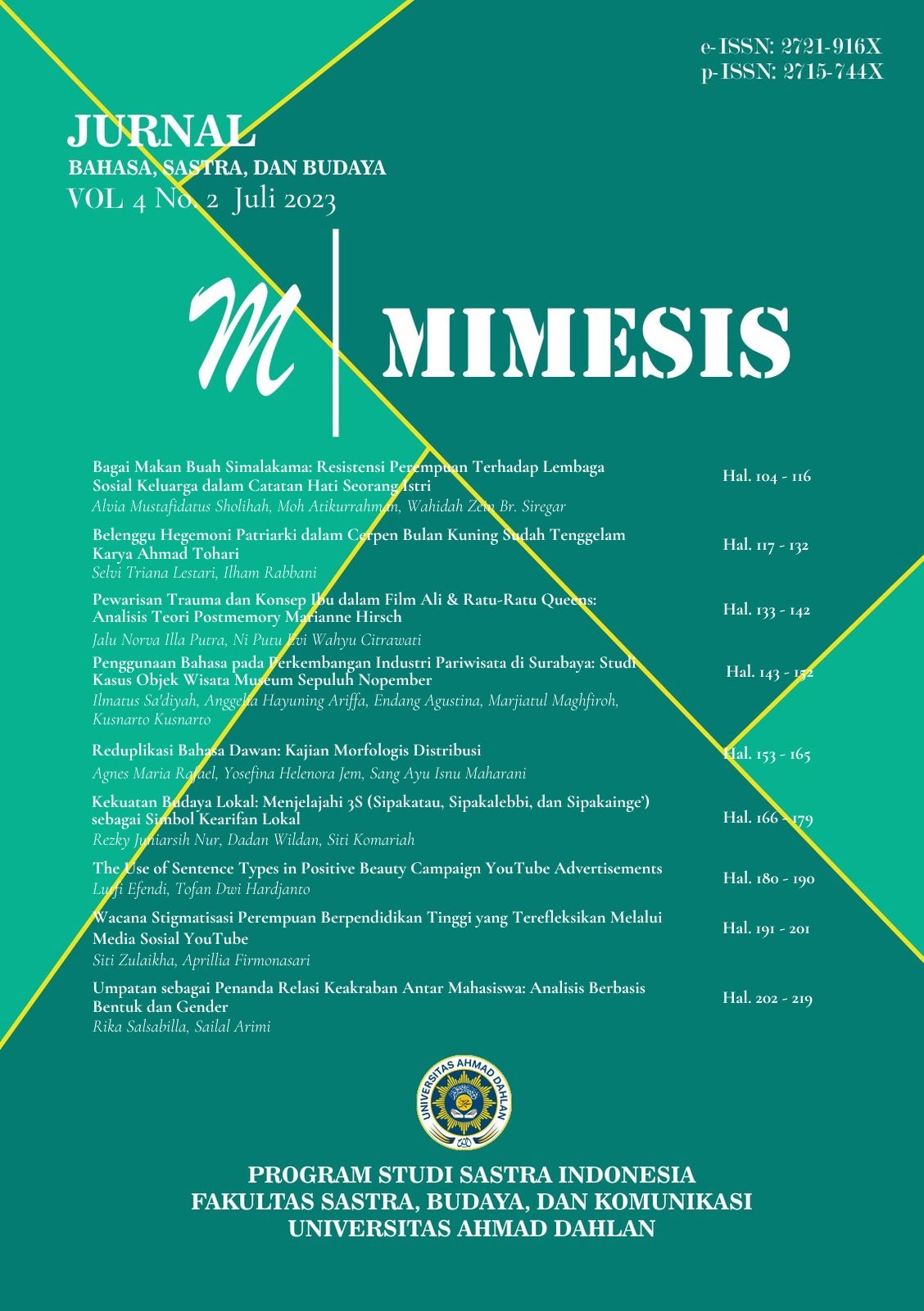Pewarisan Trauma dan Konsep Ibu dalam Film Ali & Ratu-Ratu Queens: Analisis Teori Postmemory Marianne Hirsch
DOI:
https://doi.org/10.12928/mms.v4i2.7849Keywords:
Film, Postmemory, Transmission, TraumaAbstract
This research will look at the relationship between memory and literature, which is about the process of inheritance of memory. A film entitled Ali and The Ratu-ratu Queens was chosen to be the object of this research, which will look at the relationship between memory, trauma, and the process of inheritance. This study aims to determine the trauma of the other that is passed on to the self, its transmission process and also to identify the reconstruction of the trauma that is owned by the self. This paper will use a perspective of Postmemory theory from Marianne Hirsch. Postmemory is a theory that looks at the process of inheritance of trauma between generations. This theory will look at the process of Ali as second generation inheriting his father’s trauma. Furthermore, the identification that can be obtained is that the loss that Ali feels is the loss of an "ambiguous" mother figure. Ali is looking for the mother he hoped for in the past according to the description given by his father. However, Ali did not find this mother figure as he found another mother figures that had changed due to the social factors she experienced. In the end Ali interprets that mother is not a figure, mother is a feeling of affection and a sense of belonging. Until finally Ali found what he was really looking for, namely a mother who was reflected through his aunts and a mother who represented affection and belonging which also came from the aunts who met Ali in New York.
References
Abdulah, R. D., Rabbani, I. (2022). Identitas Tokoh Pribumi dalam Cerpen Penunjuk Jalan Karya Iksaka Banu, Kajian Pascakolonial Homi K. Bhabha. Mimesis. 2(1).
Apriyani, T. (2020). Identitas Budaya dalam Novel Puya ke Puya Karya Faisal Oddang. Mimesis. 1(1).
Caruth, C. (1996). Unclaimed experience: Trauma, Narative, dan History. The John Hopkins University Press.
Erll, A., dan Rigney, A. (2006). Literature and The Production of Cultural Memory: Introduction. European Journal of English Studies. 10(2), 111-115.
Faruk. (2012). Metode Penelitian Sastra. Pustaka Pelajar.
Fernanda, A. (2017). Transmisi Trauma dalam Mother Land Karya Dmetri Kakmi: Kajian Postmemory. Tesis. Universitas Gadjah Mada.
Halbwachs, M. (1980). The Collective Memory. Harper Colophon Books.
Hirsch, M. 2008. The Generation of Generation: Poetic Today, 103-128.
Hirsch, M. (2012). The Generation of Post Memory: Writing and Visual Culture after the Holocaust. Columbia Press.
Hoffman, E. (2004). After Such Knowledge: Memory, History, and The Legacy of The Holocaust. Public Affair.
Downloads
Published
Issue
Section
License
Copyright (c) 2023 Jalu Norva Illa Putra, Ni Putu Evi Wahyu Citrawati

This work is licensed under a Creative Commons Attribution-ShareAlike 4.0 International License.
License and Copyright Agreement
In submitting the manuscript to the journal, the authors certify that:
- They are authorized by their co-authors to enter into these arrangements.
- The work described has not been formally published before, except in the form of an abstract or as part of a published lecture, review, thesis, or overlay journal.
- That it is not under consideration for publication elsewhere,
- That its publication has been approved by all the author(s) and by the responsible authorities tacitly or explicitly of the institutes where the work has been carried out.
- They secure the right to reproduce any material that has already been published or copyrighted elsewhere.
- They agree to the following license and copyright agreement.
Copyright
Authors who publish with Mimesis agree to the following terms:
- Authors retain copyright and grant the journal right of first publication with the work simultaneously licensed under a Creative Commons Attribution License (CC BY-SA 4.0) that allows others to share the work with an acknowledgment of the work's authorship and initial publication in this journal.
- Authors are able to enter into separate, additional contractual arrangements for the non-exclusive distribution of the journal's published version of the work (e.g., post it to an institutional repository or publish it in a book), with an acknowledgment of its initial publication in this journal.
- Authors are permitted and encouraged to post their work online (e.g., in institutional repositories or on their website) prior to and during the submission process, as it can lead to productive exchanges, as well as earlier and greater citation of published work.












